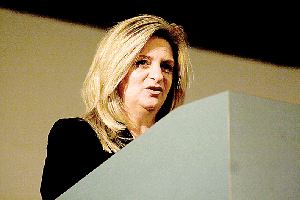
ST. FRANCIS — Although 20,000 people witnessed the shooting of Pope John Paul II while he greeted the faithful in St. Peter’s Square May 13, 1981, millions more watched it later on television. Many, however, may not be aware of the pope’s request as he lay in a hospital bed recovering from his wounds. He asked to see the diary of a little girl.
“What do any of these things have to do with us today? Well, May 13 is the day when our Blessed Mother first appeared in Fatima, and almost a century ago she told a little 6-year-old girl to pray for a man in white, with a funny hat, (who) was known as the Bishop of Rome,” Christine Mugridge explained during a Nov. 5 presentation at Saint Francis de Sales Seminary.
“Little Jacinta saw the Bishop of Rome, with red blood all over his white robe, and she couldn’t stop talking about how the woman from heaven told her to pray for the man whose life was in danger, and Jacinta proudly announced that she knew that the pope, even though would be shot and killed, would be coming back to life, because the Blessed Mother would save him,” said Mugridge, host of Relevant Radio’s “Rome to Home” program.
She shared the story as part of her talk, “The Vision of the New Evangelization for the Church of America in the Third Millennium.” The talk was presented by Relevant Radio and sponsored by Veritas Financial Services and Trinity Academy, Pewaukee.
Mugridge, who holds a master’s degree in theology and religious institutional social communications and a doctorate in social communications from the Pontifical Salesian University in Rome noted that the Second Vatican Council called for a modernization of some church practices as a means of opening a dialogue with the world and to do a better job of spreading the Gospel. Bishop Karol Wojtyla, the future Pope John Paul II, supported the church’s need for change, according to Mugridge, and made important contributions to several council documents.
“His history coincides from the Vatican Council II,” she said. “What he emphasized in his talks with the other church members was that Christ reveals the full dignity of the human person, and Christ reveals the destiny of the human person, and Christ reveals how we ought to live – essentially – with one another here, and how we ought to live in heaven through all eternity.”
She added that Christ entrusts to each person the gift to be missionaries – a point regularly made by Pope John Paul II and which Pope Benedict XVI continues to make.
“How should we reach out to the world in this task of evangelization? First of all, the church offers more than we realize,” she said. “Pope Benedict most recently said to the bishops as well, ‘Please don’t focus on your projects; look at the church as a certain entity, as a gift that is given to us by God….’”
Evangelization is simply welcoming Christ into our hearts, to the point where it fills up – overflowing – and we have no other choice but to share it, Mugridge said.
“Connected with the Vatican Council II, we’re all to go out in our own way, and our own way could be in prayer, just like our blessed little flower, St. Therese of Lisieux. Our own way could also be just to see if someone needs water; you know we all need a drink. But the general, normal way would be right back here,” she said, noting that evangelizing in one’s own part of the world is necessary, but often difficult to do.
“Have you ever heard the expression ‘All salvation comes through the Catholic Church’?” Mugridge asked the crowd. “Because when you say something like that, you usually get really excited responses, to say the least.”
Catholics who talk about their beliefs to people who don’t agree with them shouldn’t be stymied from spreading the word of God, according to Mugridge.
“The truth is, the Catholic Church is the living presence of the Mystical Body of Christ,” she explained. “He promised us that he would remain with us body, blood, soul and divinity. … Without the church, there would be no reason for us to live.”
